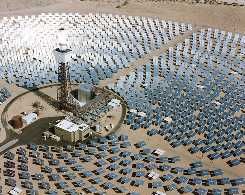Windfuels: A Practical Approach to the Climate Change Threat
2GreenEnergy supporter Dr. David Doty wrote to update me on his progress in raising the capital for his Windfuels project, and notes:
In the meantime, keep doing what you’re doing – trying to increase public awareness of the need to do much more to avert a climate disaster by mid-century, which at this point actually seems unavoidable for political reasons. See this article on “Dust-Bowlification,” as reported in Nature here:
Thanks for this. I agree with your analysis of the short-term political and economic events that have conspired to make things tough. But looking at this one way, it’s actually good news that Windfuels is still an open opportunity for an investor with vision. Yes, I’ll continue to help tell your story, and raise awareness of the threat of climate change. It’s hard to believe that we live in a country in which this is necessary, but that seems to be the case.
I hope readers will check out the article that you’ve provided above.



 Wednesday morning as I was getting ready to conclude my participation in the Renewable Energy Finance Forum, I had a thought I wanted to share. It had been two-days of nitty-gritty financial talk — extremely precise language of tax lawyers and investment bankers, which left me more than ready to resume a discussion of the “broad side of the barn.” As important as all these issues of cost of capital, production tax credits, and Senate bills addressing master limited partnerships may be, this really had been, to some degree, an exercise in missing the forest for the trees.
Wednesday morning as I was getting ready to conclude my participation in the Renewable Energy Finance Forum, I had a thought I wanted to share. It had been two-days of nitty-gritty financial talk — extremely precise language of tax lawyers and investment bankers, which left me more than ready to resume a discussion of the “broad side of the barn.” As important as all these issues of cost of capital, production tax credits, and Senate bills addressing master limited partnerships may be, this really had been, to some degree, an exercise in missing the forest for the trees. 





